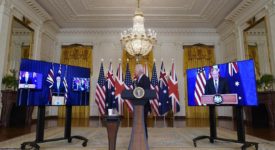Scenarios are imagined futures that can demonstrate how current actions may lead to dramatically different outcomes, but also serve as useful tools to help guide strategy and shape the future. This analysis lays out long term scenarios (2050) for the Middle East and North Africa (MENA). These conclusions point towards greater conflict and contentious state-society dynamics, regional fragmentation and shifting centres of gravity, the region’s embeddedness in global rivalries and disruptive socio-economic and environmental international trends.
Unstoppable Climate Change
By 2050 climate change will be a decisive global reality, but its impact will differ from one region to the other. The countries of the Middle East and North Africa (MENA) will be among the most affected: the effects will be felt across the region in the form of extreme weather phenomena, heat waves and droughts, desertification, severe water shortages and a rise in sea level. One of the most vulnerable areas will be the Nile Delta, where a sea-level rise of about 50 cm could force 4 million Egyptians to resettle to other areas. The region’s governments and societies will have to deal with scarcity of natural resources, including food, price volatility and the risks associated with new pandemics.
Post-Oil World
By 2050, a post-oil world order will be in place due to profound changes in the global energy market. Such a new order will not be triggered by a lack of supply: on the contrary, fossil fuel production may even increase for a time, thanks to the exploitation of new reserves, innovative investments in oil and tar sands, the popularization of LNG and fracking development projects beyond the United States. Prices may remain relatively low for some time despite the high demand from emerging economies. But in the longer term the main driver of decarbonisation will be the gigantic steps forward in technological innovation for renewable energy production and storage capacities, which will be more popular due to global awareness of the climate change.
An Urbanized Region
The MENA region is characterized by high urbanization. Some 60 percent of the population was already urban by 2018 and this trend will not be reversed by 2050. While we are already familiar with “Mega Cities” such as Cairo and Istanbul, new ones will surpass the 10 million people benchmark. Baghdad and Khartoum, each with 15 million inhabitants, will be two of the fastest-growing cities in the region. The capacities of urban spaces to accommodate this new reality will depend on the pace of growth but even more on the resources deployed by local and national authorities to upgrade basic infrastructures such as public transport, sanitation and housing.
Digitalization and Automation
Technologization will be a global megatrend by 2050. Automation and Artificial Intelligence will radically transform job markets in most countries. The MENA region will be particularly affected by those trends due to the already high (and seemingly persistent) unemployment and underemployment rates, particularly among young people. While the Gulf region and Israel may adapt more easily to these changes, other countries, with large working populations, strained job markets and insufficient governance could face major social problems. Infrastructural investment, business culture, education and regulation will also determine the ability to adapt to these megatrends.
Religiosity, Individualization and Citizenship
Societal trends in the MENA in 2050 will result from the complex interplay between endogenous and exogenous variables. Fragmentation and centrifugal dynamics are likely to shape both the religious and the secular camps as well as societies as a whole. Individualization processes, among which the fact that religious or non-religious choices will be the result of each person’s preferences, and the contestation of intermediate authorities (such as religious bodies) will further fragment each camp. In any case, attitudes towards religion will continue to be a major driver of societal and political dynamics and remain a highly contentious issue.
Strong or Fierce States
Attempts to erode or complement the role of states in the region will continue. This is likely to happen by efforts to curtail their size and prerogatives. Next to this, challenges to the authority of states will prompt analysts and pundits to speculate on the weakening or outright collapse of the state system and the redrawing of the regional order. Yet, MENA states could prove more resilient than some expected. By 2050, controlling the state will remain the main and often only guarantee for elite survival. State agents (state elites, the public sector, security apparatuses) and the dynamics revolving around them (clientelism, state capitalism) will remain predominant in the region compared with other parts of the world.
Managing the Effects of Today’s Conflicts
It is impossible to determine which of the conflicts current today will be solved by 2050 and which will still be in place – let alone to predict new ones that may emerge. Nevertheless, we can take it for granted that the effects of today’s conflicts will continue to be felt in the MENA countries in 2050. Even in those cases where effective solutions have been put forward, the post-conflict trauma will mark one or more generations. In addition, new drivers of conflict are very likely to come to the forth, but all these phenomena can turn into either sources for risks or opportunities depending on how they are managed by regional and international actors.
China: Primus Inter Pares
By 2050, China is likely to be the world’s largest economy. Its annual growth rate will have remained considerably steady, keeping in check internal tensions associated with inequality and governance deficits. After almost four decades since its inception, the Belt and Road Initiative has the potential to drastically transform the socio-economic landscape of the Asian continent and of the MENA region. On the basis of the positive returns of China’s initial investments in the 2020s, the MENA authorities’ willingness to engage with China will further increase.
Game-Changing Africa
By 2050, the African continent could be home to 2.5 billion people. This is twice as many as in 2019. Nigeria’s population will have reached 400 million and may rank 14th among the world’s largest economies. The number of African workers will have already surpassed that of China. African mobility will be a major issue, both in terms of rural exodus and international migration. Africa’s weight in global affairs will be one of the game-changers of the following decades. The MENA region will naturally look southwards, both in terms of opportunities and risks. Not only will the MENA care more about African affairs, African leaders will also have a say in the evolution of the Middle East and the Maghreb.
Europe and the MENA Region: A Family Issue
Geographic proximity will remain a key factor in the relations between Europe and the MENA region. What is likely to change is the intensity of the societal bonds between these two spaces and what governments and the people make of it. By 2050, the proportion of Europeans with some sort of MENA background will be much higher than it is today. Such people will no longer be perceived as second- or third generation migrants but as Euro-Arabs, Euro-Turks, Euro-Kurds and Euro-Amazighs. This diversity will not only be present at the level of the general population but also among the two generations of new political and economic elites. The intensity of the connections between the EU and the region could further grow if some countries of the MENA region become members or reinforce their association with the EU.
‚The Art of the (Im)Possible: Sowing the Seeds for the EU’s Constructive Engagement in the Middle East and North Africa‘ – Study by Silvia Colombo, Marc Otte, Eduard Soler i Lecha and Nathalie Tocci – Barcelona Centre for International Affairs / CIDOB.
(The Study can be downloaded here)







